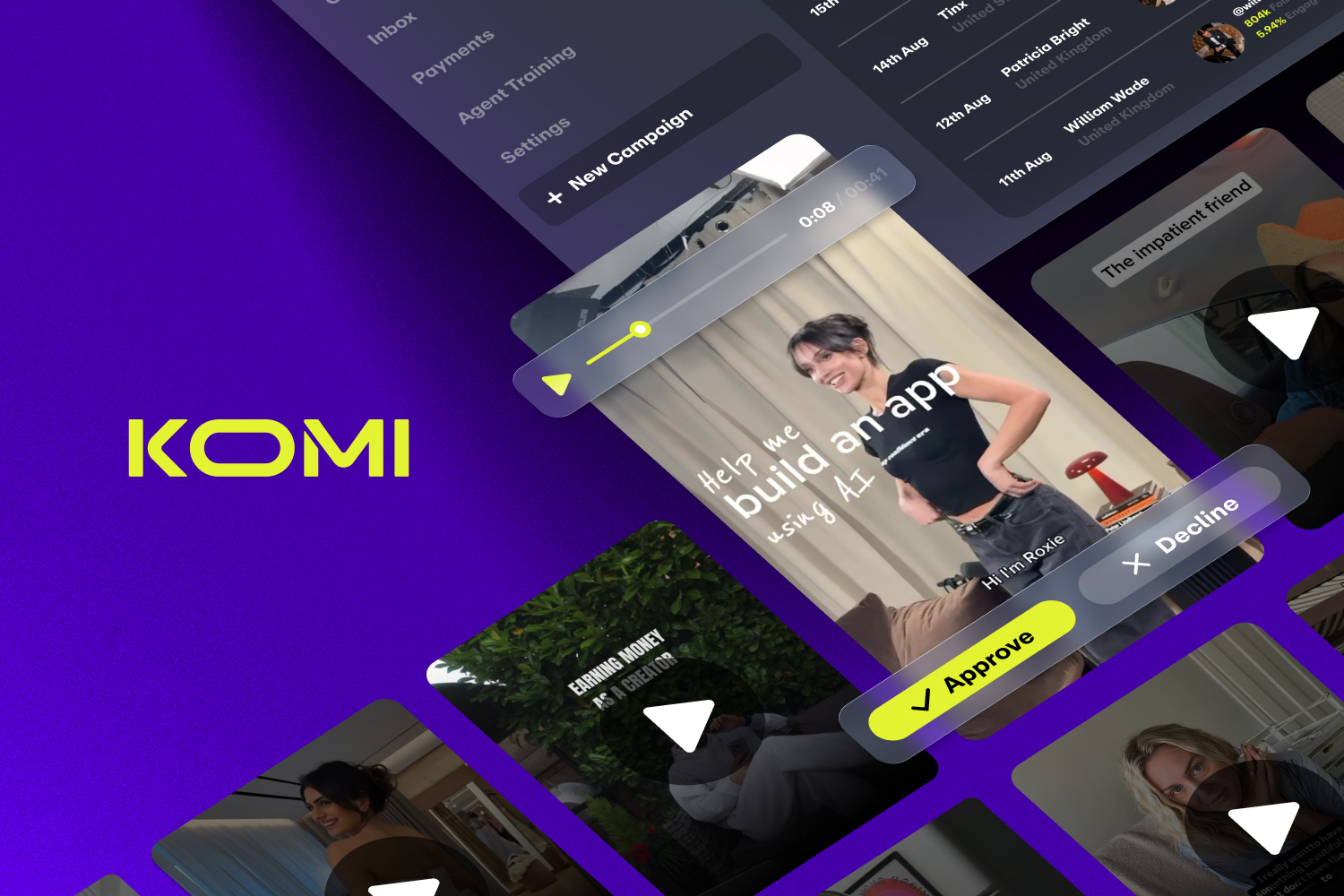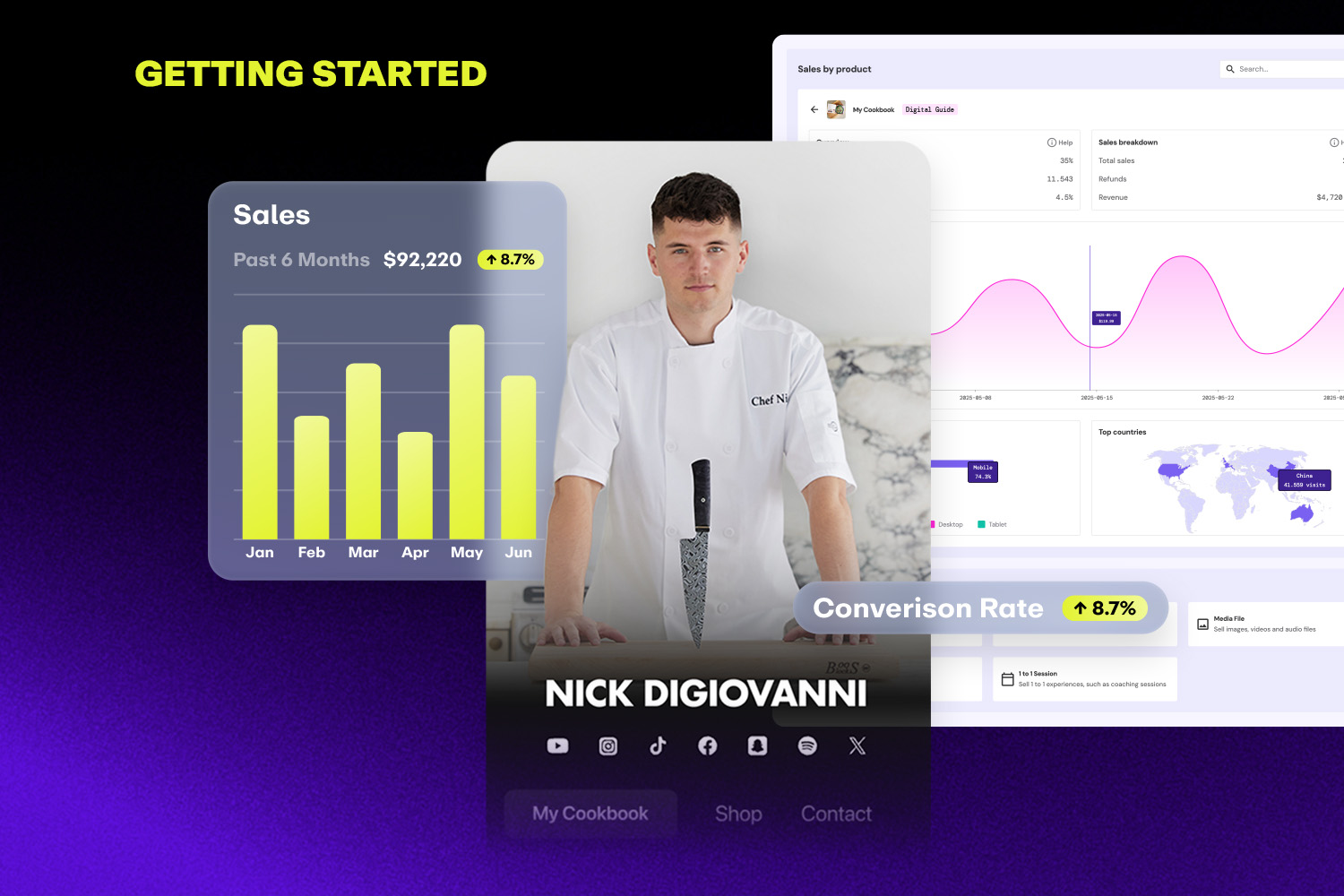The 15 Best Tools for Creators in 2024

Content creators are juggling a lot of tasks. From scheduling content and managing finances to growing an email list and marketing your products and services, there’s a lot more that goes into a successful creator business than just creating content.
With 32% of full-time content creators going it alone, there’s a large group of creators juggling all of these tasks (and more) by themselves. They do this by integrating content creation tools into their workflow to automate tedious tasks and free up time to do more of what they love: actually creating content.
We’re not just talking about content creation software here. We’re talking about an ecosystem of content creation tools that will help you optimize and monetize your content. From content research tools to visual content creation tools and a full-blown content management system, here are the best content creator tools in 2024.
1. Jasper AI for writing
Writing Instagram captions, newsletters, and video descriptions can be time-consuming (and a real drag if you hate writing). With Jasper AI, you can automatically generate written content to suit different needs, whether it’s a blog post headline or a sales page for a digital product.
If you’re concerned about sounding generic or robotic, there’s an easy fix. Share your tone of voice guide with the content creation tool (or simply share a sample of your previous written content) to give Jasper AI a sense of your personality. It then recreates this personality in its AI-generated content. The more you use AI content creation tools, the better they get at understanding your unique messaging.
Cost: Prices start at $39 a month for creators.

2. KOMI for a mini-site & a 'link in bio' tool
As a creator, the last thing you want is for your fans to click the link in your bio and be met with an unbranded, confusing list of links that sucks the joy out of your personal brand. With KOMI, it’s really easy to set up a customized, beautifully on-brand link in bio page. Custom themes, advanced analytics, and integrations with your favorite social media platforms help you create an entire creator ecosystem via one single URL.
In fact, KOMI is so much more than a link in bio tool. Your page stands as it's own mini-site, which you can populate with images, blog posts, mailing list sign-up forms, and even a native Shopify integration to showcase products, merch and affiliate links to drive sales and ultimately - help fans discover everything you do.
Cost: Get started with a 14-day free trial. Plans start at $10.50 a month.

3. Notion for planning and organization
Notion is one of the only content creation tools that offers an entire universe of planning and organization features. It can be a lot to get your head around at first, but there are plenty of tutorials and pre-made templates you can start with. The great thing about Notion is it’s a content creation tool that seamlessly slots into every stage of the content creation process, from mapping out content ideas to planning your calendar and tracking social media posts.
You can create a library of pages with built-in blocks, including tables, calendars, lists, launch timelines, Q&As, and more. Each page can be linked to other, relevant pages to create an easily navigable plan for content creation. If you’re currently wrangling a disjointed mix of Google Docs, spreadsheets, and the notes app on your phone, Notion is the perfect project management tool for your content creation process.
Cost: Free.

4. Canva for branding and templates
If you’re not a dab hand at design, it can be a real headache creating graphics in your content creation process — whether that’s covers for your Instagram Reels, YouTube thumbnails, or a logo for your latest digital product.
Canva is perhaps the most comprehensive content creation software out there with thousands of pre-made templates you can drag and drop your own fonts, colors, and images into. Even better, you can create a brand style guide that you can reference for every new graphic you make. This can save time as you don’t have to go back and forth to find the right hex code or create new graphics from scratch. You can simply duplicate existing designs and rework them.
Cost: There’s a free version and a Pro version which starts at $10 a month.

5. Capcut for video editing
Editing video content for your social media posts can be a real time-suck — especially if you’re trying to do it directly in the app (Instagram, we’re looking at you). Video content creation tools like Capcut can relieve a lot of the frustration with its pre-made templates that you can slot your own footage into. It’s ideal for replicating trending Reels on Instagram and TikTok and saves you the hassle of diligently lining up audio and video files.
There are other useful content creation tools too, including a background remover, color correction tools, and a text-to-speech option that lets you turn scripts into human-sounding voiceovers.
Cost: Free.
6. Descript for video editing
Descript offers a unique way to edit video content that doesn’t involve hours meticulously cutting footage to the second. It transcribes podcast episodes, audio files, videos, and screen recordings which you can then edit the way you’d edit a document – simply move words around to splice together different parts of the video and create crisp edits that are perfectly in time.
There’s a host of other built-in content creation tools like AI voice cloning for easy, quick voiceovers and a green screen effect that lets you replace the background of a video with another image.
Cost: Free for 1 hour of footage a month.

7. Buffer for social media scheduling
Creating content across multiple platforms requires a certain amount of planning, organization, and, most importantly, scheduling. Ideally, you don’t want to be tied to your screen at your most popular posting times. Buffer lets you schedule content to go out on different platforms so you can “set it and forget it”. This makes it easy to reach your audience when they’re most active, but it also means you can get ahead of your content schedule and not feel like you’re always on the back foot.
Buffer also has a helpful insights tool that shows you when and what to publish to make your content stand out and you can add relevant hashtags to make sure your social media posts reach the right people.
Cost: Free for up to 3 channels.

8. Grammarly for checking content
There’s nothing worse than discovering a typo in a post. Sure, you can edit it out, but there’s a good chance someone will have already spotted it. As creators, we always want to put our best foot forward, and that starts with clear, grammatically correct content. Grammarly ensures all your written content is succinct and makes sense — just run your captions, blog posts, or newsletters through it and track its suggestions.
You don’t need to approve all of Grammarly’s suggestions. It often favors clarity over personality, so check that it’s not removing the words and phrases that make you sound like… you.
Cost: Free.

9. ConvertKit for growing your email list
We should never rely solely on our social media accounts — you never know when it’s going to disappear (just look at what happened to Vine). As well as posting content publicly to your followers, you should also work on building an email list that you own just in case you get locked out of your Instagram account or TikTok decides to slash your reach in half.
ConvertKit is an email marketing tool designed especially for creators. The drag and drop interface lets you add your content to functional, clean templates, and there are handy list-building features to help you grow your subscriber base. The built-in Creator Network works as an internal referral program where you can work together with other content creators to help each other grow.
Cost: Free for up to 1,000 subscribers.

10. Gumroad for selling digital products
Gumroad offers creators a simple, visual platform to sell digital products. It’s easy to get set up, and you can choose from a variety of content formats, including video lessons, monthly subscriptions, and digital products. You can even sell physical products.
The peace of mind comes when you make a sale. For a slice of commission, Gumroad sorts out taxes and additional fees so you can sell to anyone in the world while remaining compliant.
Cost: Free.

11. Lemon Squeezy for selling digital products
Like Gumroad, Lemon Squeezy offers a platform for creators to sell their content on, whether it’s ebooks, courses, videos, subscriptions, or physical products. Again, you can set up a customized, branded sales page and Lemon Squeezy will sort out all the complicated tax stuff for you.
Cost: Free.

12. Podia for hosting courses
If you’re selling online courses, you need a platform that can manage it all for you, from upload to sales to student management. Podia offers a whole host of content creation tools, including email marketing, sales page templates, and even full-on websites, but its professional course builder is particularly good. The visual design makes it easy to add lessons, offer coaching sessions, and run webinars all in one central place.
Cost: Free to get started.

13. Circle for memberships and community
Circle calls itself the “all-in-one community platform for creators”. It has everything you need to grow and nurture a private community, including group discussions, private chat features, automated check-ins, livestreams, and paid memberships. Students and members just need one login to access any curriculums, classes, and courses, as well as community chat features where they can interact and engage with other members.
Cost: Prices start at $89 a month.

14. Shopify for creating an online store
If you’re selling physical products, there’s no better place to do it than Shopify. The sheer amount of customization features, integrations, and add-on apps means you can create a branded store that looks exactly how you want it to look. Shopify manages all the backend stuff too, like checkout, inventory, and sales.
Cost: Prices start at $29 a month.

15. QuickBooks for accounting and taxes
Managing money is an important part of running a successful content creator business. But it can be tricky when you’re juggling different revenue streams and payments from multiple platforms. QuickBooks pulls your transactions into one place so you can get an overview of your accounts whenever you want. You can also send invoices and reminders, and monitor your taxes through the platform.
Cost: Prices start at $15 a month.
Fill your tech stack with the best content creation tools
Content creator tools can speed up your workflow by helping you automate tedious tasks or manage parts of your business that you’d rather not manage yourself. There are plenty of free and paid tools you can use — for example, Google Trends is a great way to determine what topics are hot right now, while the free People Also Asked section in the search results can provide excellent content inspiration.
Finding the best content creation software for your business takes a bit of time and will depend on what stage you’re at. Full-time solo content creators might need more hands-on help than people who create content on the side of a day job, while creators with teams might need the best content creation tools for multiple users. It’s worth experimenting with different content creation tools to see which ones work best for your specific needs and then you can start slowly building a tech stack that includes your favorite content creation tools.
Earn like the world’s top creators
Claim your KOMI domain today. Plans start at $10.50 USD/month.


